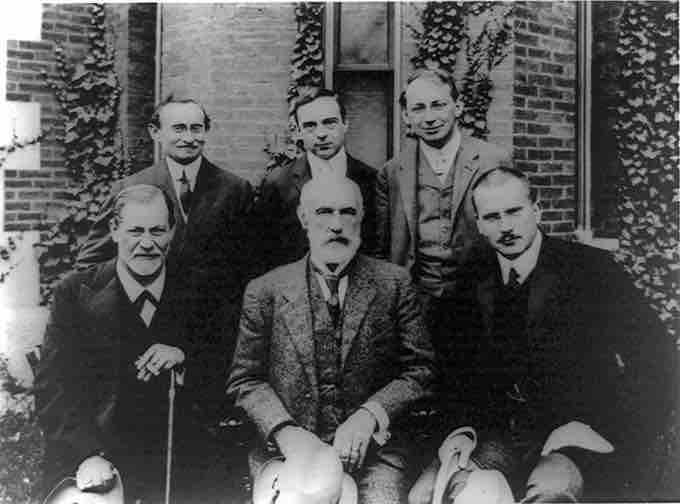Neo-Freudian Approaches to Personality
Although Sigmund Freud contributed a great deal to the field of psychology through his psychoanalytic theory of personality, his work did not go without scrutiny. Many criticized his theories for being overly focused on sexuality; over the years since his work, many other theorists have adapted and built on his ideas to form new theories of personality. These theorists, referred to as Neo-Freudians, generally agreed with Freud that childhood experiences are important, but they lessened his emphasis on sex and sexuality. Instead of taking a strictly biological approach to the development of personality (as Freud did in his focus on individual evolutionary drives), they focused more holistically on how the social environment and culture influence personality development.

Freud and his followers
Several of the psychologists who studied Freud's theories worked directly with Freud himself at Clark University. This photograph shows Carl Jung (front row, right) with Freud (front row, left) and other colleagues.
Notable Neo-Freudians
Many psychologists, scientists, and philosophers have made meaningful additions to the psychoanalytic study of personality. Four particularly notable Neo-Freudians are Alfred Adler, Erik Erikson, Carl Jung, and Karen Horney.
Alfred Adler
Alfred Adler was the first to explore and develop a comprehensive social theory of the psychodynamic person. He founded a school of psychology called individual psychology, which focuses on our drive to compensate for feelings of inferiority. Adler proposed the concept of the inferiority complex, which describes a person’s feelings that they lack worth and don’t measure up to the standards of others or of society. He also believed in the importance of social connections, seeing childhood development as emerging through social development rather than via the sexual stages outlined by Freud. From these ideas, Adler identified three fundamental social tasks that all of us must experience: occupational tasks (careers), societal tasks (friendship), and love tasks (finding an intimate partner for a long-term relationship).
Erik Erikson
Erik Erikson is influential for having proposed the psychosocial theory of development, which suggests that an individual’s personality develops throughout the lifespan based on a series of social relationships—a departure from Freud’s more biology-oriented view. In his psychosocial theory, Erikson emphasized the social relationships that are important at each stage of personality development, in contrast to Freud’s emphasis on sex. Erikson identified eight stages, each of which represents a conflict or developmental task. The development of a healthy personality and a sense of competence depend on the successful completion of each task.
Carl Jung
Carl Jung followed in Adler's footsteps by developing a theory of personality called analytical psychology. One of Jung's major contributions was his idea of the collective unconscious, which he deemed a "universal" version of Freud's personal unconscious, holding mental patterns, or memory traces, that are common to all of us (Jung, 1928). These ancestral memories, which Jung called archetypes, are represented by universal themes as expressed through various cultures' literature and art, as well as people's dreams. Jung also proposed the concept of the persona, referring to a kind of "mask" that we adopt based on both our conscious experiences and our collective unconscious. Jung believed this persona served as a compromise between who we really are (our true self) and what society expects us to be; we hide those parts of ourselves that are not aligned with society’s expectations behind this mask.
Karen Horney
Karen Horney was one of the first women trained as a Freudian psychoanalyst. Horney’s theories focused on "unconscious anxiety," which she believed stemmed from early childhood experiences of unmet needs, loneliness, and/or isolation. She theorized three styles of coping that children adopt in relation to anxiety: moving toward people, moving away from people, and moving against people.
Horney was also influential in the advancement of feminism within the field of psychodynamics. Freud has been widely critiqued for his almost exclusive focus on men and for what some perceive as a condescension toward women; for example, Horney disagreed with the Freudian idea that girls have "penis envy" and are jealous of male biological features. According to Horney, any jealousy is most likely due to the greater privileges that males are often given, meaning that the differences between men’s and women’s personalities are due to the dynamics of culture rather than biology. She further suggested that men have "womb envy" because they cannot give birth.